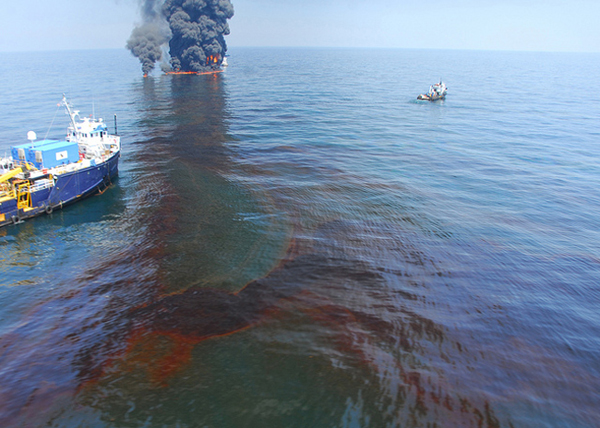- La Feria Community Holds Succesful Business Mixer Event
- Little Nashville to Take Place in Downtown Mercedes
- Lions Basketball Captures District Gold
- La Feria ISD Students Compete in Regional Chess Tournament
- Lions End First Half of 32-4A on a High Note
- La Feria ISD Held Another Successful Parent Conference
- Strong Appearance for Lions at Hidalgo Power Meet
- LFECHS Students Get to Meet Local Actress
- Students Participate in Marine Biology Camp
- Two LFECHS Students Qualify for All-State Band
Penalty Phase Begins in BP Oil Spill Disaster Trial
- Updated: February 3, 2015
by John Michaelson/TNS
SOUTH PADRE ISLAND, Texas – The third and final phase in the civil trial over the massive Deepwater Horizon oil spill in the Gulf of Mexico began Tuesday, January 20, 2015, and will determine the penalties which British Petroleum (BP) will ultimately receive for violations of the Clean Water Act.
The company was already found “grossly negligent” and largely responsible for the environmental disaster. Now, the trial turns to how much the British oil giant will be fined.

The penalty could be as high as $13.7 billion for BP, as the final phase in the trial over the 2010 Deepwater Horizon oil spill disaster in the Gulf of Mexico began Tuesday, January 20, 2015. Photo: U.S. Coast Guard.
David Muth, director of the Gulf Restoration Program for the National Wildlife Federation, says the range is from about $3 billion to a maximum of just under $14 billion.
“Because the judge has ruled gross negligence, one would expect something moving toward the higher end,” he says. “You spill it, you clean it up. You pay for the cleanup, you pay for the response.”
The amount will be based on evidence presented during this phase on BP’s response to the spill, along with the judge’s determination that more than three million barrels of oil ended up in the Gulf.
Eighty-percent of the fines levied will be sent to Texas and the other states along the Gulf Coast for recovery efforts under the RESTORE Act. Muth says among the most notable impacts is the apparent link between the spill and the decline of the world’s most endangered sea turtle.
“The Kemp’s Ridley has a significant breeding population on Padre Island, and those young Kemp’s Ridleys were out in the middle of the spill and coming back to Texas for nesting,” says Muth. “For Texas it was really about the resources that were affected, more than the beaches that were oiled or the marshes that were oiled.”
The BP Deepwater Horizon disaster happened on April 20, 2010, when 11 people lost their lives in the explosion and fire aboard the offshore oil platform.
Also found to be liable, although to a much lesser extent, were BP contractors Transocean, which owned the mobile drilling rig, and Halliburton, which was responsible for the rig’s cementing operations.
The RESTORE Act acronym stands for Resources and Ecosystems Sustainability, Tourist Opportunities and Revived Economies.


